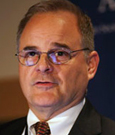About one-third of the most important clinical advances in cancer last year were made possible at least in part through federal funding, according to ASCO’s annual report on progress in cancer, published in the Journal of Clinical Oncology.1
Significant Declines in Funding
The report, “Clinical Cancer Advances 2013,” describes 76 major advances in prevention, treatment, and survivorship chosen for their potential to improve patient care and quality of life. Of the 76 advances, 26 were studies directly supported by federal dollars. These include many genomic and molecular profiling studies, several large prevention and screening trials, and early trials of promising agents for aggressive or treatment-resistant cancers.
That so many of the advances were federally funded points to the urgency of restoring funds for publicly supported research, said Richard L. Schilsky, MD, Chief Medical Officer at ASCO. Declines in federal funding due to sequestration and other measures have already slowed current research and could have a severe impact on future studies, especially on those that are least likely to be undertaken by the private sector.
“Many important questions can be answered only through publicly supported research, which is in real jeopardy,” Dr. Schilsky said.
Genomic Research
Examples of such questions are those that address a cancer’s entire genome. Among 2013’s major advances was the comprehensive genomic analysis of 200 tumor samples from adults with de novo acute myeloid leukemia, which is associated with recurrent genetic abnormalities.
The analysis was the work of The Cancer Genome Atlas (TCGA) Research Network, a program of the National Cancer Institute. In 2013, TCGA also reported the results of comprehensive molecular analyses of kidney and endometrial cancers.
The resulting databases are available to researchers worldwide and can facilitate the search for new targeted therapies. While developing targeted treatments is generally the province of drug and biotech companies, discovery of the target has often been in federal laboratories or with federal dollars, Dr. Schilsky noted.
“TCGA investigators will keep coming out with previously unrecognized genetic abnormalities,” he predicted. “Then enterprising companies can come up with the targeted agents. That lets biotech and drug companies do what they do best—product development. It’s the perfect synergy between private enterprise and public research.”
The ASCO report includes a policy section that discusses the impact of sequestration on National Institutes of Health (NIH)-funded studies and strongly recommends increased funding: It calls for $32 billion for NIH in next year’s budget, of which $5.2 billion would go to the National Cancer Institute (NCI).
Clinical Trials
The report also recommends more support for clinical trials in general and the NCI-sponsored cooperative groups, now consolidated into the National Clinical Trials Network, in particular. It notes that long-planned trials have not been able to open for patient enrollment and that as a result, the number of patients taking part in clinical trials has dropped from a high of more than 29,000 a year in 2009 to 20,000 in 2013.
As with genomic studies, the drop in federal funding for trials bodes ill for clinical questions that are not typically addressed in the private sector.
“What gets lost when people talk about the clinical trials is that there are certain kinds of trials that government can do and the private sector doesn’t do,” said Dr. Schilsky.
Trials of treatment strategies using drugs already approved offer one example. Among the 76 most important advances in 2013 was a breast cancer trial showing that adjuvant paclitaxel given weekly, in lower doses, was significantly less toxic than the standard dose-dense regimen given every 2 weeks. It was also less expensive. Though the drug has been on the market for many years, the new finding is expected to change practice, making an important difference for hundreds of thousands of women.
Early studies of experimental therapies, many federally funded, are also highlighted in the report. In relapsed, therapy-resistant childhood acute lymphoblastic leukemia (ALL), an immunotherapy using genetically modified T cells to attack cancerous B cells was tried for the first time. The first two children who received the T cells experienced complete remission, one for 11 months and one for 2 months.
“These early results show promise that in the future, engineered T cells may become a radical new strategy for advanced, treatment-resistant ALL,” according to the report.
Large-scale prevention and screening trials are another example of studies that require public funding. The ASCO report singles out results from the NCI-sponsored National Lung Screening Trial, showing that low-dose computed tomography (CT) scans reduced the mortality of non–small cell lung cancer among smokers and recent former smokers by 20%. As a result, the U.S. Preventive Services Task Force started recommending CT screening for those at high risk.
About the Report
The 76 advances in the annual report, now in its ninth year, were identified by an editorial board led by Co-Executive Editors Jyoti D. Patel, MD, Northwestern University, and Bruce J. Roth, MD, Washington University at St. Louis. The editors reviewed research published in peer-reviewed scientific journals and presented at major scientific meetings over a 1-year period (October 2012 to September 2013), covering prevention, screening, treatment, patient and survivor care, biomarkers, tumor biology, and cancer disparities.
In addition to its publication in the Journal of Clinical Oncology, the report is available with additional resources at www.cancerprogress.net/cca. ■
Disclosure: Drs. Schilsky and Patel reported no potential conflicts of interest. Dr. Roth has received research funding from Exelixis, Medivation, and Oncogenix.
Reference
1. Patel JD, Krilov L, Adams S, et al: Clinical cancer advances 2013: Annual report on progress against cancer from the American Society of Clinical Oncology. J Clin Oncol 32:129-160, 2014.




